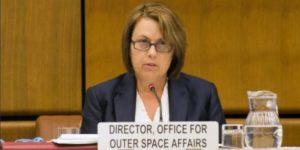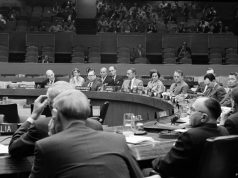
By Juan Cruz González Allonca
Simonetta Di Pippo is one of the world’s leading experts in international cooperation in the aerospace sector. Between 2008 and 2011 she was Director of Manned Flights of the European Space Agency (ESA) and until March 2014 she was in charge of the Observatory for European Space Policy at the Italian Space Agency, in Brussels. Since June 2009 she is also President of the international association WIA-Europe (Women in Aerospace Europe), of which she is co-founder. In March 2014, she assumed the position of Director of the United Nations Office for Outer Space Affairs.
On this occasion, the director of UNOOSA granted an interview to DerechoEspacial.Org, and with her we started the new section of “Cosmic Interviews”. Ms. Di Pippo spoke about UNOOSA’s plans to help developing countries to access space, and to get more women into the space sector.
What is the role of UNOOSA today?
The United Nations Office for Outer Space Affairs (UNOOSA) works to bring the benefits of space to all humankind.
UNOOSA is the sole United Nations office responsible for promoting international cooperation in the peaceful uses of outer space. The Office supports all United Nations Member States in establishing legal and regulatory frameworks to govern space activities and assists in strengthening the capacity of developing countries to use space science, technology and applications for development by helping to integrate space capabilities into national development programmes.
The Office serves as the secretariat for the General Assembly’s only committee dealing exclusively with international cooperation in the peaceful uses of outer space, the United Nations Committee on the Peaceful Uses of Outer Space (COPUOS), as well as its two subcommittees.
UNOOSA also discharges the Secretary-General’s responsibilities under international space law and maintains the United Nations Register of Objects Launched into Outer Space, the only existing treaty-based tool supporting TCBMs (transparency and confidence-building measures) in outer space activities.
The Office works closely with United Nations Member States to support their capacity-building efforts in space activities and their development of national space infrastructure. The Office does this by organizing workshops on space-based technology subjects, space law and policy, as well as on questions relating to international cooperation in space activities and on United Nations space-related activities.
UNOOSA’s Programme on Space Applications builds capacity and promotes cooperation in space science and technology. UNOOSA provides capacity-building, education, research and development support and technical advisory services on topics that include basic space sciences, basic space technology and human space technology, and promoting Global Navigation Satellite Systems and integrated space technology applications in the areas such as global health, disaster management, climate change, humanitarian assistance, environmental monitoring and natural resource management, and more. Additionally, through its United Nations Platform for Space-based Information for Disaster Management and Emergency Response (UN-SPIDER) programme, UNOOSA also supports United Nations Member States to access and use satellite data for disaster recovery, risk reduction and emergency response.
Under the Programme on Space Applications, UNOOSA also has a Human Space Technology Initiative (HSTI) programme to help everyone, everywhere, access space and its benefits. Initiatives under HSTI include:
- The joint KiboCUBE initiative with the Japan Aerospace Exploration Agency (JAXA), which offers educational and research institutions from developing countries the opportunity to deploy cube satellites from the International Space Station.
- The UNOOSA fellowship programme for research teams to conduct microgravity experiments at the Bremen Drop Tower in Germany.
- An agreement with Sierra Nevada Corporation (SNC) to provide opportunities for Member States, especially non-space-faring ones, affordable access to SNC’s Dream Chaser to develop and fly payloads for missions related to experiments in microgravity conditions that contribute to the fulfilment of the Sustainable Development Goals (SDGs).
- Agreements with the China Manned Space Agency to enable Member States, particularly developing countries, to conduct space experiments on-board China’s future space station, as well as to conduct a feasibility study to look at also providing flight opportunities for astronauts and payload engineers.
Furthermore, UNOOSA is the executive secretariat of the International Committee on Global Navigation Satellite Systems (ICG), which promotes voluntary cooperation on matters of interest related to civil satellite-based positioning, navigation, timing and value-added services. UNOOSA is also the permanent secretariat to the Space Mission Planning Advisory Group, which considers asteroid impact mitigation.
UNOOSA prepares and distributes reports, studies and publications on various fields of space science, technology applications and international space law. These documents and reports are available through the UNOOSA website.
In June begins the UNISPACE + 50, what is it?
UNISPACE+50 will be the first United Nations global space summit of the twenty-first century
Our goal for UNISPACE+50 is to build, together with all stakeholders, a new concept of global governance of space activities,known as the “Space2030” agenda, that supports the use of space for the attainment of the Sustainable Development Goals and is based on the peaceful exploration and uses of outer space. We want to make sure space is accessible to all and that space technology and applications are used to bring concrete benefits to humankind. At the same time, space needs to stay sustainable so it can be used by future generations.
That is why the UNISPACE+50 and Space2030 will take into account the interdependencies in the space sector and foster international cooperation, paying special attention to future space-faring and developing countries while carefully considering the long-term sustainability of outer space activities. Space2030 will be based on four pillars: space economy, space society, space accessibility and space diplomacy.
Furthermore, the Space2030 agenda will be aimed at reducing the so-called “Space Divide” – the gap between the nations that have developed space-related capabilities and technologies, and those who do not have access to these capabilities and their benefits.
As part of preparations for UNISPACE+50, COPUOS agreed to seven thematic priorities for activities to guide discussions on the future of international space cooperation. These seven thematic priorities are:
- Global partnership in space exploration and innovation
- Legal regime of outer space and global space governance: current and future perspectives
- Enhanced information exchange in space objects and events
- International framework for space weather services
- Strengthened space cooperation for global health
- International cooperation towards low-emission and resilient societies
- Capacity-building for the 21st century.
After flagship initiatives, such as conferences, under each thematic priority, recommendations have been developed by stakeholders from the broader space community, which will now be incorporated into UNISPACE+50 and the Space2030 agenda.
What are the basis for future plans for the UN in space?
In line with UNISPACE50+ and Space2030, the United Nations Office for Outer Space Affairs engages extensively in capacity-building, focused on non-space faring nations and developing countries, to help countries use space science, technology and applications for sustainable development goals. Some of our exciting, upcoming initiatives in this field include:
- A partnership with the China Manned Space Agency (CMSA) to enable United Nations Member States, particularly developing countries, to conduct space experiments on-board China’s future space station, and an agreement to conduct a feasibility study on provide flight opportunities for astronauts and payload engineers to China’s space station.
- A partnership with Sierra Nevada Corporation (SNC) to provide opportunities for Member States, especially non-space-faring ones, affordable access to SNC’s Dream Chaser to develop and fly payloads for missions related to experiments in microgravity that contribute to one or more of the Sustainable Development Goals. A Call for Interest closed in November, and we are now organising a technical briefing for interested parties on 10 January 2018.
The global space community is continuing to grow and diversify, and to this end, UNOOSA will continue to support the Committee on the Peaceful Uses of Outer Space and its growing membership, as well as increase engagement with the private sector. This includes the High Level Forum series, which participants at this year’s forum recommended become an annual event for discussion amongst the broader space community.The High Level Fora are unique events, consisting of expert presentations and highlevel panels, bringing together a wide range of participants, including academia, international organizations, non-governmental organizations, governmental entities, space agencies, and the private sector.The Fora started as one of a range of flagship activities to provide recommendations for UNISPACE+50, and have since been extended past UNISPACE+50 to provide an ongoing opportunity for engagement amongst the broader space sector, including input into UNOOSA and COPUOS.
We expect that Space2030 will further determine the Office’s activities and priorities in the coming years.
What is the role of women in the aerospace sector today?
As humankind makes significant scientific and technological advancements, there is still a gender imbalance in the aerospace sector. While there is an encouraging improvement, women’s contributions and potential are still not fully utilized. It is imperative that we empower women to start working towards a career in the space sector, to strengthen women in pursuing a career in the space sector and to support women to stay in the space sector.
In response to this, and in line with Sustainable Development Goal 5 “Gender Equality” and Sustainable Development Goal 4 “Quality Education”,UNOOSA is developing a Space for Women project to get more girls and women into STEM education, especially in developing countries, and to promote gender mainstreaming in the space sector. The first step in developing this project was the Space for Women Expert Meeting to gather experiences and recommendations from which the project will be developed. This Expert Meeting, held in New York from 4 to 6 October 2017, in cooperation with UN Women, addressed current problems regarding the involvement of women in the space sector by bringing together participants from the private sector, research institutions and experts from United Nations entities as well as leaders of civil society.
In the near future, the “Space for Women”project will endeavour to equip governments with policies and technical capabilities to integrate gender perspectives into their space technology and applications, as part of the strategic planning to address global development frameworks. The Space for Women Project will become operational in 2018.
What are the UN strategies to narrow the gap between developed countries and, in turn, between men and women?
UNOOSA’s goal is to bring the benefits of outer space to all of humankind. An important part of achieving that is working closely with non-space-faring and developing countries, particularly in capacity-building. Having access to space brings countries a number of advantages since space technologies are widely used in telecommunications, to track weather, improve crops, study disease, manage disaster, amongst many other things.
The Office provides capacity-building and advisory services for the benefit of developing countries through workshops, training courses, projects, education curricula and other initiatives on topics that include remote sensing, satellite navigation, satellite meteorology, tele-education, space science, and space law. More than 21,000 participants have attended over 300 UNOOSA training activities in the last 45 years. UNOOSA particularly encourages women to apply for these opportunities.
We have been ramping up our Human Space Technology Initiative (HSTI) to involve more countries in activities related to human space flight and make space exploration a truly international effort, inclusive and open to everyone. HSTI activities include the KiboCUBE programme, a partnership with the Japan Aerospace Exploration Agency (JAXA) that offers educational and research institutions from developing countries the opportunity to deploy cube satellites from the Japanese Kibo module of International Space Station (ISS). This is an example of our triangular approach to capacity-building, where the Office works with a space faring nation to help non-space-faring nations develop their space technology capabilities.
Also under the HSTI, an agreement signed last year between UNOOSA and the China Manned Space Agency will enable Member States to conduct space experiments in microgravity conditions on-board China’s future space station. And we’re cooperating with the Sierra Nevada Corporation to provide United Nations Member States – with a particular focus on developing countries – to send space science experiments into low-Earth orbit for an extended duration as part of research in pursuit of the Sustainable Development Goals. This will be especially beneficial to countries who cannot afford their own standalone space programme but will, through this initiative, have the opportunity to conduct research in space.
Furthermore, the Space2030 agenda, which will result from UNISPACE+50, will be aimed at reducing the so-called “Space Divide” – the gap between the nations that have developed space-related capabilities and technologies, and those who do not have access to these capabilities and their benefits.
How do you imagine space in 50 years?
Space is both an frontier and an endless opportunity. As much as I believe that looking at the universe out there and fostering cooperation in space exploration will hold the key for humanity in the distant future, I am convinced it is important to cooperate right now to preserve our home. In this world of growing interdependence and interconnectivity, the survival of humanity will depend even more on cooperation, collaboration and good global governance. Therefore, I hope that space will enable us to increase our international cooperation to use and explore space to the benefit of all.




